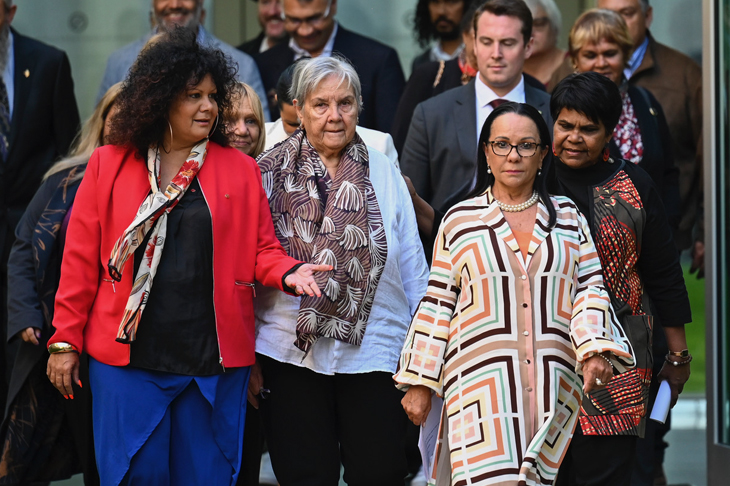Whoever said that the Voice would usher in a new era of reconciliation, unity and love was either excessively optimistic or a complete fool. Everywhere I look, I see division and disunity and it is all generated by the Voice. Not only is it generated by the Voice but by putting up a proposal that is unnecessary, half-baked and full of flaws, its advocates have made it one that will achieve nothing of value for Aboriginals and generate nothing for the country but further division. You only have to listen to the invective and denigration by Noel Pearson of anyone who disagrees with him to see how true that is.
The NSW Bar has already been divided by its decision to take a partisan position to become advocates for the Voice. Now, it is the turn of the Victorian Bar to be divided. Here, we are grappling with two rival proposals before us. The first is a proposal that the Voice is clearly a contentious political issue on which the Bar should not take a position of public advocacy for one side of the argument or the other. That is so because the Bar has always taken the view that it should be non-aligned on political issues and that its sole approach should be to ensure the proper administration of law and justice for the whole of society.
The second proposal is that the Bar should abandon this time-honoured position, support the Voice and publicly argue for its adoption at the referendum. If that proposal is passed, the Bar will no longer be independent, but a political body arguing for the fashionable cause.
You will notice that the Bar is not being offered a third choice that should be there, that it should not take a stand, but that if it does, it should argue for the No side. Here then, like a good lawyer, are my reasons why the Bar should not take an official position and why, if it does, it should support the No case.
First. Those who say that they support the Voice because they want the best for Aboriginals are being fooled and should look at just what the Voice entails. This objection has been put, and far more eloquently than I could express it, by Senator Jacinta Nampijinpa Price in the best argument against the Voice so far. If passed and it goes into the constitution, she argues, the Voice will be there forever; it is unthinkable that there could be another referendum to take it out. This means that Aboriginals are, and always will be, seen as so hopeless that they will never stand on their own feet and will forever need a government vehicle to prop them up, think for them and demand a never-ending series of government handouts to solve a never-ending list of grievances. This will give Aboriginal people nothing to look forward to but a life of misery and permanent dependence on the state.
Second. It is now beyond argument that the very existence of the Voice will divide us on lines of race. Only those who claim they are indigenous will have the right to vote for it, and only they will be allowed to take part in its activities. If that were being proposed for the old South Africa, we would be appalled by its effrontery. We should be similarly outraged when it is being proposed for our own country.
Third. The argument that the Voice would generate litigation every time it is not consulted and every time it does not get its own way, has now been won. Its own supporters not only acknowledge that litigation over advice from the Voice will be the result, but they expect it and welcome it.
Fourth. This inevitable torrent of litigation will upend the stable system of government that we have and that has made Australia one of the oldest functioning democracies. On any test it will be a rival government, not even elected by all Australians. It will expand its own jurisdiction as it claims that one after another area of government or commercial activity is a matter ‘relating to’ Aboriginals and therefore an area on which it can give its so-called advice to the parliament and the government.
Fifth. Moreover, this argument is not diminished by the Solicitor-General’s opinion but enhanced by it. The Solicitor-General said in the sanitised opinion we are allowed to see, that it would be ‘desirable’ for the government to consider advice from the Voice. If it is ‘desirable’, that is the first thing the courts will say gives them the justification to stop or delay decisions on which advice has been given, but not considered or to stop decisions being made until that advice has been sought and given. So much for our representative system of government where decisions are made by the elected government for all, and not just one segment of the community.
Six. The Voice proposal will not stop at setting up a talking shop for indigenous issues. The next step will be min-voices with all the trappings of the state, including the power to enter into treaties. Already, the proponents of the Voice are arguing that its establishment will link up with the new Victorian structure that has set up a train of inquiries, ‘truth telling’, treaties and, the next cab off the rank, reparations for the terrible burden of having to live in one of the most prosperous countries on earth.
I hope this charter makes it clear that this contentious issue should not be endorsed by a professional association like the Bar. But if the Bar decides that it should intervene, it should not rush to endorse the Voice. There are strong arguments against it and it is a lot to risk. Above all, the Voice will do nothing but turn Aboriginals into one tribe of a society based on race and guarantee their continued and soul-destroying dependence on the state.
Got something to add? Join the discussion and comment below.
Get 10 issues for just $10
Subscribe to The Spectator Australia today for the next 10 magazine issues, plus full online access, for just $10.
You might disagree with half of it, but you’ll enjoy reading all of it. Try your first month for free, then just $2 a week for the remainder of your first year.















Comments
Don't miss out
Join the conversation with other Spectator Australia readers. Subscribe to leave a comment.
SUBSCRIBEAlready a subscriber? Log in